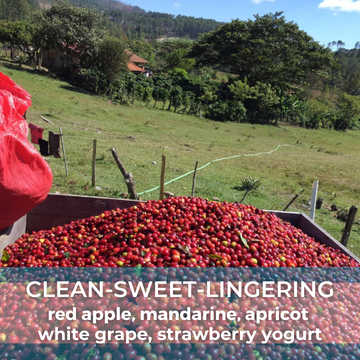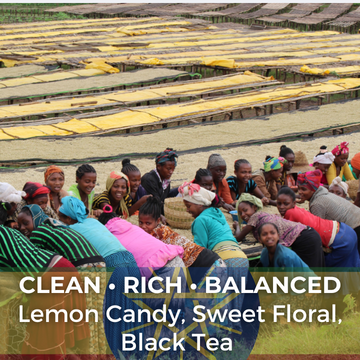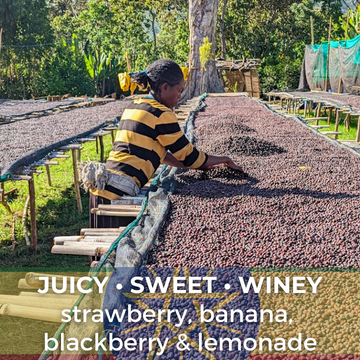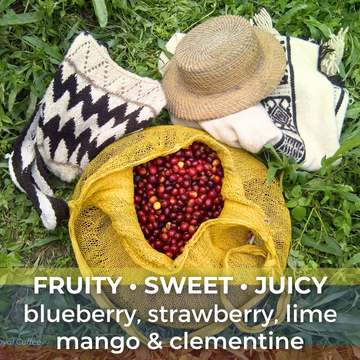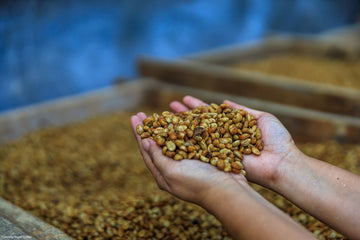Uganda Embogo Natural
Embogo’s unique taste profile evokes the diverse landscapes of the region where coffee is produced. From the mighty snow-capped Rwenzori mountains to the beautiful, lush savannah of the plains, the diverse ecosystems where this coffee is grown provide ideal conditions for cultivating sweet, dense coffees.
Embogo’s accessibility and high-quality is due to our vertically integrated supply chain, which enables us to select the best cherry and meticulous process it for these lots. The resulting consistency and quality are hard to resist.
Farmers selectively handpick ripe cherry and deliver it to washing stations or supply chain agents near them. Cherry is carefully sorted at intake where under- and over-ripes, as well as any foreign matter, are removed.
Quality assurance begins as soon as farmers deliver their cherry. All cherry is floated in small buckets as a first step to check quality. After floating, cherry is transported to raised drying beds. Each table has dedicated workers focusing exclusively on caring for drying cherry. Workers rake cherry frequently to promote even drying. They also keep track of the weather to make sure cherry is properly protected from rain, excess moisture and too much sunlight. Each table has a traceability tag with the lot info. When drying is completed, cherry pods are delivered to our dry mill in Kampala. The mill has the capacity to mill smaller lots separately to help preserve quality and traceability. Reminder! This coffee is raw, you must roast it before brewingArrival Date: April, 2025
Acidity & Brightness: Rounded sweetness
Balance & Finish: Fairly complex, lingering, uniformed
Body & Texture: Creamy, Rounded, Fruity
Flavors: Plum, Mango, Lemon, Blueberry and Chocolate
Grade: grown at 1300 - 2000 masl
Processing: Natural
Grower: Registered farmers working with UGACOF
Region: Western Uganda
Varietals: SL14
Recommended Roast Range: City to Full City (Light to Medium)
We like this coffee best at City+ (Light-Medium, tail end of first crack). For best results avoid roasts going into second crack, darker roasts will mute some of the more subtle flavors in the cup. Lighter roasts will exhibit more florality and emphasize blueberry notes while medium roasts will favor “biscuity” notes as chocolate.
The farm structure in Uganda is similar to Ethiopia and Kenya. Around 5 million people—or 1.7 million households—are employed in the coffee sector. Coffee is Uganda’s largest export commodity and is worth $550 million annually. Since 85% of all coffee grown is cultivated by smallholders with fewer than 2.5 hectares, Uganda has an immense potential to produce high quality, small lot specialty coffees.
Because most farms are owned by families who are also growing subsistence crops and overall productivity remains low, almost ¾ of the population is employed in agriculture. Such families are faced with difficult choices and a lot of guesswork to determine the best way to use their small plots of land. Too much of a cash crop and, in low price years, they go hungry. Not enough, and they cannot pay their bills. So, like Ethiopia, Ugandan smallholders typically intercrop their coffee with traditional food crops.
Most farmers producing washed coffees use hand pulpers. Newer initiatives to make eco-friendly integrated pulping systems more widely available are underway. Washed Arabicas from the Western areas are typically marketed as “WUGAR”. Those coming from the East are usually called Bugisu or Bugishu. Bugisu is in high demand for its winey, fruity, traditionally East African cupping notes. Both regions are demonstrating a substantial potential for even higher quality.
